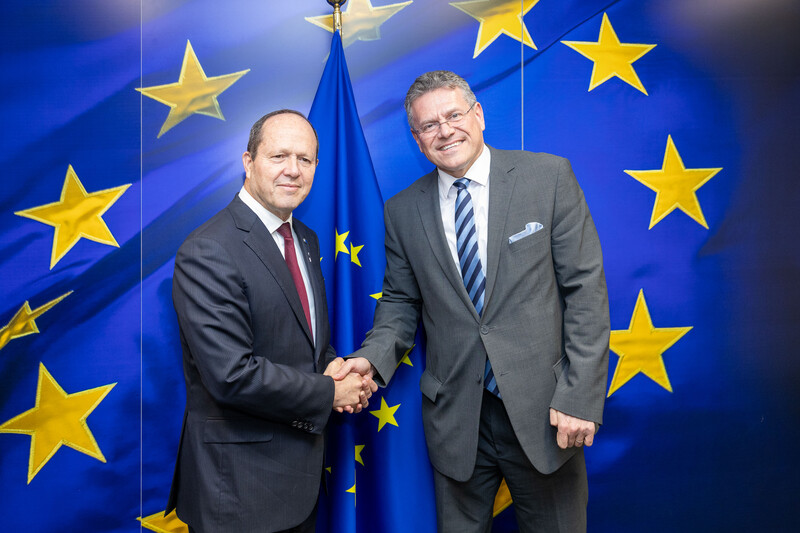Rights and Accountability 29 April 2025

Israel’s Nir Barkat (left) talks trade with the EU’s Maroš Šefčovič. (Xavier Lejeune / European Union)
One complaint that I have heard countless times over the past 18 months is that the European Union has done nothing amid the genocide in Gaza.
The truth is that Brussels officials have been quite active. They have been active trying to boost cooperation with Israel, the state carrying out the genocide.
A document obtained via a freedom of information request gives some insight into such efforts. It concerns a discussion held between Maroš Šefčovič, the EU’s trade commissioner, and Nir Barkat, Israel’s economy minister, in March.
Two main topics were addressed, according to a readout of the meeting – see below.
First, Barkat gave an update on a reform measure known as “What’s good for Europe is good for Israel.” It allows a wide range of goods authorized in the EU to enter Israel without undergoing inspections.
The reform came into effect on 1 January.
That timing is significant. It illustrates that work aimed at integrating the economies of Israel and Europe has been advanced during the war of extermination against Gaza.
“Very good partners”
The second item raised in the discussion between Šefčovič and Barkat was medical devices.
Šefčovič wants Israel’s parliament, the Knesset, to pass a law that would end what he described as “discrimination.”
Medical devices exported from the EU are regarded as conforming with Israeli requirements. Yet Israel has not formally removed an anomaly under which equipment from the EU’s newest entrants – mostly countries in central and eastern Europe – are treated differently to its older members.
In December last, Israel’s health ministry issued an order whereby all EU medical device exporters would be treated the same until the end of 2025.
As a temporary solution has been found, the “discrimination” exercising Šefčovič is clearly not urgent.
There are much worse cases of discrimination in the medical world. Palestinians, for example, are victims of extreme discrimination.
Essential treatments that are readily available in the West have been denied to Gaza as Israel tightens an already comprehensive blockade.
Hospitals – including those specialized in cancer and pediatric care – have been bombed and shelled. Babies have been left to die as patients were forced to leave their beds.
Doctors have been kidnapped and tortured. Medics have been massacred.
All of these attacks on healthcare are more serious than the “discrimination” faced by some medical device makers. All of them would be grounds for halting cooperation with Israel if the EU was serious about upholding international law.
In a new opinion piece, Josep Borrell, the EU’s erstwhile foreign policy chief, expresses frustration with Germany, without having the courage to name that state explicitly.
“For some European countries, historical guilt over the Holocaust has arguably been transformed into a ‘reason of state’ that justifies unconditional support for Israel, risking engaging the EU in complicity with crimes against humanity,” Borrell writes.
Borrell fails to fess up to how he personally advocated closer relations between the EU and Israel for most of his stint as foreign policy chief. The stance he took contributed to the current situation – a situation in which his successor Kaja Kallas publicly celebrates how the EU and Israel are “very good partners.”
Last month Israel announced that it had received approximately $1.25 billion in EU funding for scientific research from 2020 to 2024.
The total would be even higher if you include grants which the Brussels bureaucracy approved for Tel Aviv University and Hebrew University of Jerusalem earlier this year. The projects involved focus on such matters as weight loss, immunity and the development of psychiatric drugs.
The obscene irony of subsidizing medical innovation in Israel as that state starves and traumatizes Gaza is either lost on Kaja Kallas or else she and her colleagues do not care. They appear committed to remaining “very good partners” with Israel regardless of how much pain it inflicts on Palestinians.






Add new comment